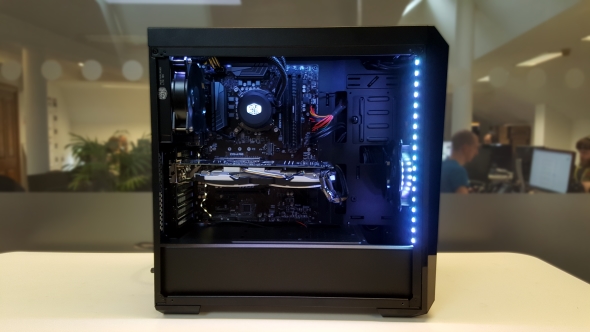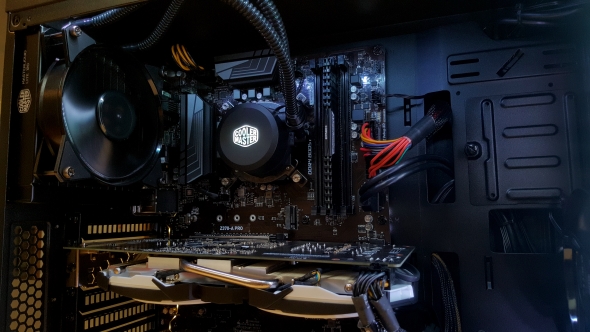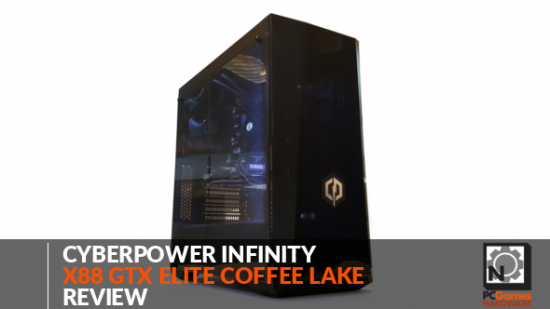The latest gaming rig from Cyberpower may have a peculiarly elongated name, but its basic spec is set to be the new normal for $1,000 / £1,000 Intel Coffee Lake PCs from now on. The Cyberpower Infinity X88 GTX Elite (see what I mean?) pairs the overclockable Intel Core i5 8600K with Nvidia’s GTX 1060 to deliver a great price/performance mix.
Your PC deserves a new keyboard, right? So check out our pick of the best gaming keyboards around.
For your £999 outlay you get that CPU/GPU combo, paired up with a price-conscious MSI Z370 motherboard, and a 120mm Cooler Master liquid chip-chiller to make good with the overclocking should you so desire later on. But, to be honest, if you’re picking a new PC on the basis of it having a K-series CPU inside it, but don’t ever want to overclock, then you’re wasting a good chunk of your build budget.
As this is an Intel Coffee Lake build designed to hit a specific price point Cyberpower have been rather parsimonious in the actual build. You won’t find any factory-installed overclocking here; the six-core i5 8600K simply runs at its stock clockspeeds. In an MSI motherboard, that means we’re talking about a 4.1GHz maximum all-core clockspeed, not the sort of Turbo rating belligerence you get from Asus and ASRock when it comes to topping the official Intel specs.
The budget-oriented MSI Z370-A Pro, however, isn’t going to let you hit the 5GHz+ overclocking heights we’ve managed with its Gaming Pro Carbon AC sibling. It boots at that speed but quickly drops the frequency, sometimes by a large margin, once you start pushing the silicon inside. That said, you should still be able to get a bit north of the single-core Max Turbo speed of 4.3GHz.

Into that board Cyberpower have dropped 8GB of speedy Corsair DDR4 memory, rated at 3,000MHz. That’s some quick ol’ memory, but Cyberpower have committed the now-classic cardinal sin of system builders and only filled out a single channel of the available memory spec. Instead of using a pair of 4GB modules they’ve instead opted for the slightly cheaper option of a single stick of 8GB RAM. Because you’re only utilising single channel memory that means they’ve instantly halved the memory bandwidth of the machine. This is something that hugely frustrates me, especially as it’s denoted specifically as ‘dual channel memory’ on the Cyberpower configurator.
Cyberpower have also dropped a 120GB SSD into the package, which does mean your general OS performance should be pretty swift, but with only around 100GB left to you after a fresh operating system installation there’s precious little capacity for speedy gaming performance. Especially as something like Shadow of War will swallow up the entirety of your SSD.
Still, at least you’re getting some decent gaming performance out of this classic combo, most especially at the 1080p standard. At that resolution, you’ll comfortably be topping the 60fps mark in the latest games at the highest settings, and often way above that figure. The Cyberpower Extreme Naming Conventions PC will net you some rather impressive 1440p performance on occasion, too.
We’ve put it up against the Scan 3XS Gamer, the only other Intel Coffee Lake machine we’ve tested so far, as well as a Kaby Lake Core i5 DinoPC Primal GT4 Stealth, which was only £100 cheaper at launch. That also had a GTX 1060 inside it but only of the 3GB variety.
Unfortunately, even with the the 6GB frame buffer of the MSI GTX 1060, the single channel memory configuration means you’re going to struggle at that higher resolution going forward. This is highlighted by the ultra-low minimum frame rates thrown up by some of the games. Even at 1080p Shadow of War’s high-res textures means the Nvidia card runs out of space and has to try and use the criminally slow system memory to compensate.

Overall, though, the GPU/CPU pairing makes for a good basic setup and a good value gaming rig. But I’m not 100% sold on the rest of the Cyberpower build. I do like the clean white LED lighting strip inside the chassis, highlighting the components and the perspex frontage of the Cooler Master chassis. It’s also been well put together inside, with the sort of cable management you’d hope for from a professional outfit.
But I can’t forgive the hobbling of the PC’s memory performance. And I struggle with the idea of a 120GB SSD being used in a modern gaming PC. I could have probably forgone the LEDs and happily swapped the K-series i5 with the excellent Intel Core i5 8400 in exchange for dual channel memory support and a 250GB SSD.
It’s not a bad machine, and with some time in the system configurator you could make it a great one, but as it stands the Cyberpower Infinity X88 GTX Elite is a tough Coffee Lake machine to recommend. Let alone say out loud.
